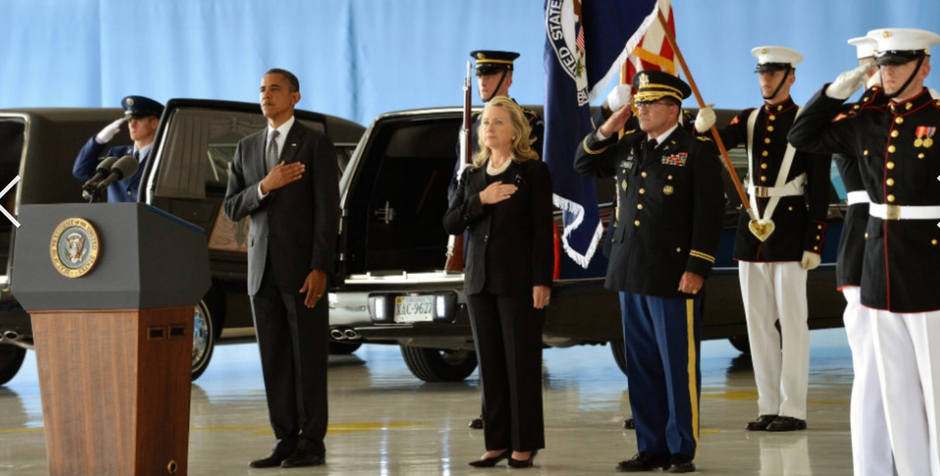The Faces of Benghazi: My Personal Experience With the Families of the Fallen
With the report of “The House Select Committee on Benghazi” last week the attention of the nation rightly focused on the horrible events of September 11, 2012. There are still many unanswered questions.
It is unlikely that President Obama or former Secretary of State Clinton will offer any additional information. They simply want to move on from this fateful chapter. They want us to ignore the deception that a video caused the attack that took the lives of Ambassador Stevens and three other Americans, and the fact that the deliberations at the White House that afternoon were more concerned with politics and President Obama’s legacy (to say nothing of his pending re-election) than the rescue of Americans who were fighting for their lives. They want us to see these as inconsequential and a political witch-hunt. As the former Secretary of State so infamously asked in her testimony before Congress, “At this point, what difference does it make?”
I was there. The answers to these questions make a big difference. They matter to the families of Chris Stevens, Sean Smith, Tyrone Wood, and Glen Doherty.
When our Ambassador to Libya and three others were killed, we moved our honor ceremonies for these men from Dover to Andrews Air Force Base. I was the Master of Ceremonies and the officer who had the honor of walking in front of the transfer cases bearing the bodies of these brave men as they were placed in front of hundreds of people who had come to pay their respects. More significant for me, I got to speak with each of these families and, for a brief moment, share their grief.
There is no way for me to articulate the sights, sounds, and emotions at this final homecoming for these men. So much was said. So many hugs given and received. So many tears shed. Even then, so many questions asked. And, yes, Secretary Clinton did tell these families that the massacre in Benghazi was instigated by an obscure You Tube Video. The grief of these families was palpable, grief compounded by the lies, deceptions, and political expediency that continued long after the ceremony ended.
After the playing of hymns, I said a prayer and introduced Secretary Clinton to the large audience. After she spoke, she introduced President Obama. After the President had finished his remarks, I asked the people to stand for the playing of the National Anthem as we rendered honors to the nation for whom these four men had given their lives. Then after a prayer committing Christopher, Sean, Tyron, and Glen to the loving God who had created them, I escorted the President and the Secretary of State back to their chairs and resumed my position at the end of the first row.
We all stood as the band began to play again and the Honor Guard began to slowly move the flag-draped transfer cases to the four matching hearses that had been parked next to each body.
As the musicians played My Country, Tis of Thee, Patricia Smith—whose son’s body was directly in front of us some 75 feet away—began to sing the words to this patriotic hymn. With tears filling her eyes and yet a smile on her face she sang, “My country tis of thee, sweet land of liberty, of thee I sing. Long may your land be bright with freedom’s holy light; protect us by thy might, great God our King.” Struck by her faith intermingled with her grief, I looked at her with amazement and admiration. Looking at me she said, “I am so proud of my son. And I am so grateful to live in this country.” It was a striking tribute to her son at what had to be one of the saddest moments of her life.
It was at this moment that I felt a tug on the right pants leg of my uniform. The music was still playing, the bodies still being moved, as I looked down into the innocent faces of Sean Smith’s children. Sean was not only former military and an American who had given his life in defense of his nation, Sean was their daddy.
As I looked at the tears in this little girl’s eyes, and noticed her brother who seemed so innocent and curious about all that was going on—I fought back my own tears. As the music continued, I knelt in front of these children. I hugged Sean’s daughter and put my hand on his son’s shoulder. I told them, “Today is a very sad day. It is okay that you are feeling sad and I know you will miss your daddy. But I want you to know that he would be proud of you and that you will not always feel as sad as you are feeling today.”
As I stood to face the ongoing ceremony in front of us, his daughter leaned against me and wrapped her arms around my leg. She had probably embraced her dad in much the same way as she was now embracing me. I thought of my own children. The families of these four men, the stories they shared, and the dramatic mixture of their grief and patriotism lives on in the minds and hearts of we who spent time with them that day.
Let me answer the Secretary’s question: THIS is the difference it makes. Four families were shattered. I saw them. I talked with them. I have heard them speak since. The Obama Administration’s indifference and desire in this political season to just “put this behind us” only adds to the inexpressible grief of four American families. Maybe the Administration can put this behind it. The families cannot.
